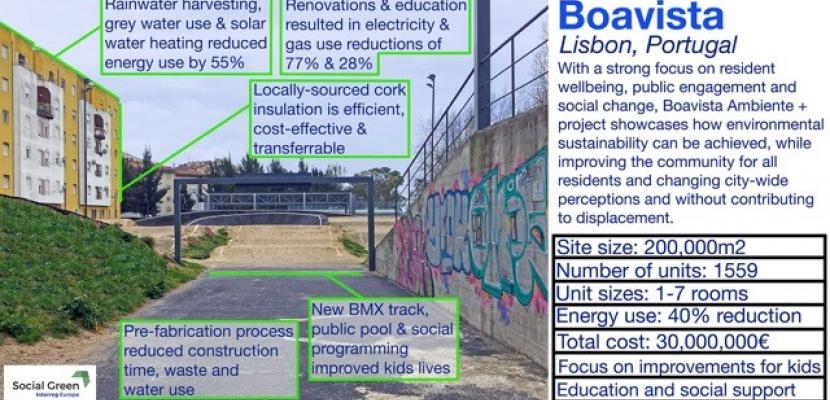Image

Restoring Historical Social Housing through a Sustainable Innovation Integrated Model
Published on 01 August 2018

Portugal
Área Metropolitana de Lisboa
This is the good practice's implementation level. It can be national, regional or local.
About this good practice
Boavista consists of two zones. The Masonry Zone consisted of 502 primarily single-family that were undersized and degraded. The New Zone consisted of 61 buildings (1057 dwellings) with poor energy-environment performance), had façade fissures and condensation issues. The Eco-Bairro Boavista Ambiente+ intervention linked sustainable urbanism to socioeconomic improvements through high quality engagement, the provision of new services and amenities, improved safety and an emphasis on active mobility. In the New Zone, facades were insulated with nationally-sourced cork. Existing windows were replaced with energy efficient windows. Innovative sustainable building techniques included pre-fabrication, which resulted in reduced water use, eliminated the need for on-site material processing and significant waste reduction. The metal components employed will be 100% recyclable. These buildings, optimized for sun exposure, will integrate a collective solar solution for hot water production. They also include a rainwater harvesting grid for the irrigation of plots, as well as gray water reuse systems for flushing cisterns. Technical measures were combined with resident engagement to encourage energy and water savings, while a PediBus and bike lane reduce car dependence. Rent was secured at 25% of a dwelling’s income, ensuring the renovations will not force residents out. New amenities include a community building, public pool, BMX track, free wireless access and improved public spaces.
Expert opinion
The Eco-Bairro Boavista Ambiente+ intervention is a strong example of integrated, holistic renovation, taking account not only of requirements to reduce energy consumption, but also aiming to improve quality of life for inhabitants, considering water usage, sustainable construction materials and also sustainable mobility concerns. It is an excellent approach for renovating social housing districts.
Works at
Interreg Europe Policy Learning Platform
Resources needed
30,000,000 € (65% ERDF and 35% Lisbon Municipality) are in the process of being used to retrofit a total of 1559 units; to develop the mobility plan and its actions, new recreational spaces such as the BMX track; and other facilities in the area such as a multipurpose community building.
Evidence of success
An analysis of New Zone dwellings found average energy reductions of 40% per dwelling. Participants in the Coopetir engagement project, which coupled improvements to the built form with education and instruction about how to further decrease resource consumption, and with socioeconomic support, led to reductions in electricity, water and gas consumption of 77%, 55% and 28%, respectively. Average rent in the redeveloped New Zone units is € 78, an indication that the units remain affordable.
Potential for learning or transfer
The project contains more transferrable elements, covering an array of issues, than 1000 characters permits. Combining environmental sustainability goals and socioeconomic improvement, with an emphasis on limiting resident displacement is highly transferrable. Cork insulation, pilot tested in Boavista, has already been exported to Brazil and Tunisia, with further opportunity for transfer. The Coopetir project, which aimed to provide sustainability education and basic social service to the residents of the Boavista neighbourhood, has, for its exemplary and collaborative methodology, all the conditions to be replicated in other neighbourhoods. The students who participated in the Esquilo project, which, among other activities, promoted a practical course for neighbourhood students, with training, construction and operation of domestic scale wind turbines, shared their experience with other school’s students in Lisbon, where it is planned to develop similar projects.
Further information
Website
Good practice owner
You can contact the good practice owner below for more detailed information.
Organisation
Lisbon Municipality

Portugal
Área Metropolitana de Lisboa
Contact
Project Analyst
